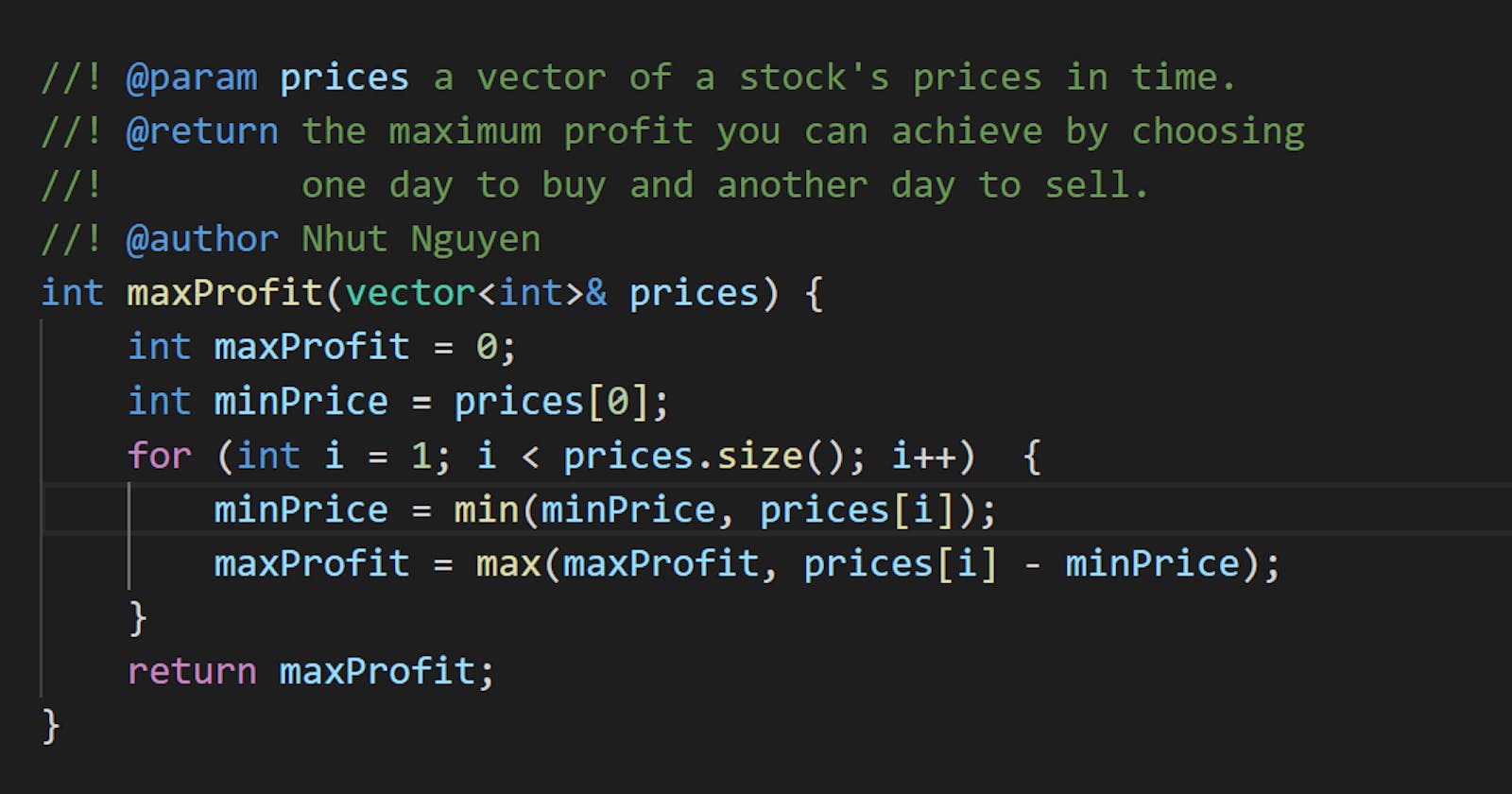Problem statement
You are given an array prices where prices[i] is the price of a given stock on the i-th day.
You want to maximize your profit by choosing a single day to buy one stock and choosing a different day in the future to sell that stock.
Return the maximum profit you can achieve from this transaction. If you cannot achieve any profit, return 0.
Example 1
Input: prices = [7,1,5,3,6,4]
Output: 5
Explanation: Buy on day 2 (price = 1) and sell on day 5 (price = 6), profit = 6-1 = 5.
Note that buying on day 2 and selling on day 1 is not allowed because you must buy before you sell.
Example 2
Input: prices = [7,6,4,3,1]
Output: 0
Explanation: In this case, no transactions are done and the max profit = 0.
Constraints
1 <= prices.length <= 10^5.0 <= prices[i] <= 10^4.
Solution 1: Bruteforce
For each day i, find the day j > i that gives maximum profit.
Code
#include <vector>
#include <iostream>
using namespace std;
int maxProfit(vector<int>& prices) {
int maxProfit = 0;
for (int i = 0; i < prices.size(); i++) {
for (int j = i + 1; j < prices.size(); j++) {
if (prices[j] > prices[i]) {
maxProfit = max(maxProfit, prices[j] - prices[i]);
}
}
}
return maxProfit;
}
int main() {
vector<int> prices{7,1,5,3,6,4};
cout << maxProfit(prices) << endl;
prices = {7,6,4,3,1};
cout << maxProfit(prices) << endl;
}
Output:
5
0
Complexity
Runtime:
O(N^2), whereN = prices.length.Extra space:
O(1).
Solution 2: Smallest and largest prices
Given a past day i, the future day j > i that gives the maximum profit is the day that has the largest price which is bigger than prices[i].
Conversely, given a future day j, the past day i < j that gives the maximum profit is the day with the smallest price.
Code
#include <vector>
#include <iostream>
#include <algorithm>
using namespace std;
int maxProfit(vector<int>& prices) {
int maxProfit = 0;
int i = 0;
while (i < prices.size()) {
while (i < prices.size() - 1 && prices[i] >= prices[i + 1]) {
i++;
}
auto imax = max_element(prices.begin() + i, prices.end());
auto imin = min_element(prices.begin() + i, imax);
maxProfit = max(maxProfit, *imax - *imin);
i = distance(prices.begin(), imax) + 1;
}
return maxProfit;
}
int main() {
vector<int> prices{7,1,5,3,6,4};
cout << maxProfit(prices) << endl;
prices = {7,6,4,3,1};
cout << maxProfit(prices) << endl;
prices = {2,4,1,7};
cout << maxProfit(prices) << endl;
prices = {2,4,1};
cout << maxProfit(prices) << endl;
}
Output:
5
0
6
2
Complexity
Runtime:
O(N), whereN = prices.length.Extra space:
O(1).
Solution 3: Only the smallest price
Given a future day j, the past day i that gives the maximum profit is the day with minimum price.
Code
#include <vector>
#include <iostream>
using namespace std;
int maxProfit(vector<int>& prices) {
int maxProfit = 0;
int minPrice = prices[0];
for (int i = 1; i < prices.size(); i++) {
minPrice = min(minPrice, prices[i]);
maxProfit = max(maxProfit, prices[i] - minPrice);
}
return maxProfit;
}
int main() {
vector<int> prices{7,1,5,3,6,4};
cout << maxProfit(prices) << endl;
prices = {7,6,4,3,1};
cout << maxProfit(prices) << endl;
prices = {2,4,1,7};
cout << maxProfit(prices) << endl;
prices = {2,4,1};
cout << maxProfit(prices) << endl;
}
Output:
5
0
6
2
Complexity
Runtime:
O(N), whereN = prices.length.Extra space:
O(1).
References
Thanks for reading. Feel free to share your thought about my content and check out my FREE book “10 Classic Coding Challenges”.

